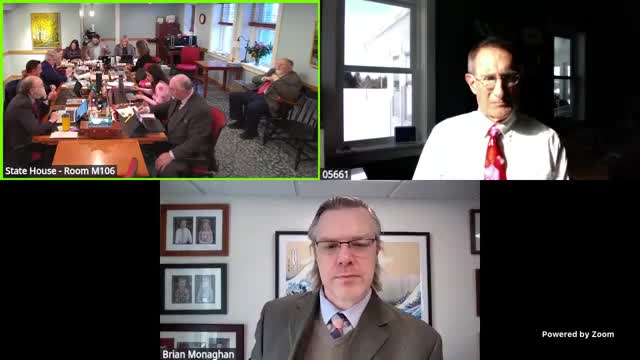Morristown voters approved first charter; Legislature probes manager-delegation language in H.17
Get AI-powered insights, summaries, and transcripts
Subscribe
Summary
Morristown voters approved the town’s first charter by a 5-to-1 margin, and the House Government Operations & Military Affairs Committee spent part of its hearing on H.17 scrutinizing a provision that lets the town manager authorize department heads to hire, appoint, discipline or remove employees under the manager’s supervision.
Morristown voters approved the town’s first charter by a 5-to-1 margin, and the House Government Operations & Military Affairs Committee spent part of its hearing on H.17 scrutinizing a provision that lets the town manager authorize department heads to hire, appoint, discipline or remove employees under the manager’s supervision.
The measure — H.17, the act relating to approval and adoption of the charter of the town of Morristown — was presented to the committee on testimony from town officials and their counsel. Chris Palermo, vice chair of the Morristown Select Board, told the committee that the charter committee and select board deliberately used language from other municipal charters, including wording taken from Waterbury’s charter, to keep the document “simple and straightforward.” He summarized local support for the charter and explained the contested manager-delegation sentence, saying it is meant to allow the manager and department heads to work together on personnel decisions.
"By giving the manager the ability to authorize a department head to hire, appoint, discipline, or remove an employee subject to the manager's discretion and supervision respects the department head's expertise and experience in their vocation," Palermo said, describing the clause as intended to strengthen managerial operations rather than diminish the manager’s duties.
Brian Monahan, an attorney with Monahan Safar who represents municipalities around the state, told committee members the authority described in the charter is already grounded in state law and is best read as a clarification rather than an expansion of manager powers. "Arguably, this is something that would increase protections for employees," Monahan said, arguing the provision could create an additional internal step for resolving grievances and reduce the need for outside counsel or arbitration.
The town’s election results, shared in testimony, show 2,404 ballots cast for the charter question: 2,002 yes, 402 no, from a checklist of 4,453 registered voters — a turnout of about 55.1 percent on that question, Palermo said. He told the committee the select board and charter committee concluded the language after deliberation and that voters approved the draft by a substantial margin.
Committee members asked how the provision would interact with collective bargaining and existing labor protections. Monahan and Palermo both said state labor statutes and employee protections remain in force and that the charter language does not alter statutory rights. "All our labor laws, certainly at the state level, remain intact," Monahan said, citing state statutes governing managers and employment protections and saying the proposal "does not impact any of the important rights that employees have."
Committee members said they would request formal review from their labor counsel and legislative counsel to ensure the provision does not create unintended ambiguities in practice. Vice Chair Hango and others said they are familiar with labor negotiations at the municipal level and want counsel to confirm how delegation language would interact with collective bargaining agreements and grievance procedures.
Background provided in testimony indicates Morristown’s charter committee and select board intentionally borrowed language used in Waterbury’s recent charter change; proponents cited local experience with unionized departments and the practical need for department-head involvement in personnel decisions under a manager form of government. Witnesses also noted that Morristown currently has multiple union agreements, including for highway and ambulance staff.
No legislative vote on H.17 was recorded during the hearing; committee members said they would return after counsel review. The town-level adoption by Morristown voters is complete; the committee’s next steps are to assess statutory interaction and report back to its lead counsel before moving forward.
Votes at a glance
Town of Morristown charter question (local adoption reported to committee): ballots cast 2,404; yes 2,002; no 402; outcome: approved by town voters (turnout on question ~55.1% of checklist of 4,453). No legislative vote on H.17 recorded at this hearing.
